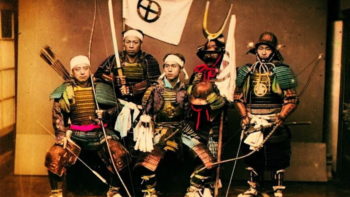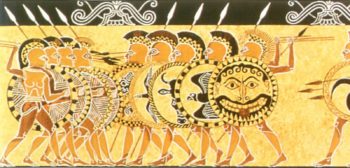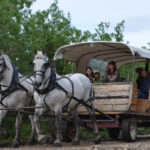Speculative Fiction Writer’s Guide to War, part 11: Training a Spartan, Samurai, or Starship Trooper
Travis P here. In part 7 of this series we discussed those combatants who are naturally elite in a way most warriors are not (in not suffering harmful effects of combat stress). Spartans, in spite of battlefield courage that implies they are natural-born warriors, were in fact the product of superior training, training that in essence was designed, as much as was humanly possible, to overcome the psychological difficulties a human being experiences in combat. Note that this kind of highly-trained fighting professional is a different sort of fighter than found in warrior cultures who emphasized battlefield rage. This type of elite training was not just a characteristic of Spartans, it was also true of a number of other renowned warriors from times past, such as Samurai. And in spite of the fact that elite troops in our own era tend to recruit those with unusual natural talent for war (intentionally or not), elite training is the primary factor that explains the amazing skills of elite troops of our own era and the imagined future warriors like those in Robert A. Heinlein’s Starship Troopers.

Samurai: Colorized public domain image of real samurai
Let’s start with Samurai. Their training varied greatly according to social class and time period, but they generally began at the age of 5. Poorer warriors were instructed in the samurai art of bushido by family members, while wealthier families enrolled their sons in special schools. All samurai training emphasized the calmness of mind required for archery and for a period they practiced archery on living dogs running for their lives (this practice was eventually abandoned as too cruel). It also included a great emphasis on horsemanship, swordsmanship, and heavy armor training–including, due to Japan’s many rivers and coastal areas, how to swim in armor. They also emphasized unarmed fighting that developed into many modern forms of Japanese martial arts. In addition, they engaged in acts of physical endurance and resistance to pain, such as standing naked in a snowbank.
Note some of the key features of this kind of training were shared by other professional warrior cultures of ancient and Medieval times, such as the traditional training of European knights. Ancient training methods understood that someone raised into warfare from childhood would adopt the methods of fighting as second nature. They emphasized a person deliberately calming self, facing bloodshed, and enduring pain, all with the purpose of muting natural psychological reactions to these conditions that humans normally experience.

Ancient pottery image of Greek warriors, from: http://spartareconsidered.blogspot.com/2011/09/physical-appearance-of-spartans.html
Spartan training shared these features with the Samurai, but did so more systematically. Their training began at age 7, later than Samurai training, but it exceeded them in difficulty, in standardization, in requirements for group training, and in total commitment. Like samurai and other professional warriors of the past, Spartans trained in unarmed combat to include boxing and wrestling, but considered gymnastics and the ability to dance important warrior skills as well. A Spartan warrior would train continuously until age 18, when he would be considered an adult and be expected to marry. At age 20 he would allowed to attempt to join the army–he would only be accepted after being examined and considered fully qualified. Spartans in the army lived together in barracks and continually trained for warfare (an actual war was considered something of a vacation), only visiting their homes on occasion (which were run by the women of the family), serving from ages 20 to 60. Warriors older than 60 returned home, but still maintained the equivalent of “reserve status,” where they could be called upon in the event of a national emergency.
In Starship Troopers, elite warriors were not raised as such from childhood, just as is true in modern militaries. I will let Travis C tell you more about what the society of the story was like below as he uses Heinlein’s novel to illustrate our point, but note troopers lived normal lives until reaching adulthood. In Starship Troopers (the novel contains more of these details than the movie), recruits were subject to vigorous psychological testing (which the story presumes would be accurate) that assigns new troops exactly to those specialties they are most suited to perform–which would clearly put naturally elite troops in front-line combat positions. Recruits were also trained according notions of psychology that include some indirect reinforcement of positive behavior with rewards–but mostly centered on the use of corporal punishment as negative reinforcement. Soldiers could voluntarily leave service at any time, though if they were due punishment, they would need to be flogged first. But by recruiting from those people who most wanted to service, they had few troopers actually decide to leave the service–however, their system included the strictest form of elimination of incompetent soldiers. The novel featured live-fire training and harsh survival exercises that could prove fatal to those troops not performing actions as they’d been trained to do them.
All of these warriors, bot the real and the fictional, not only trained the body, they also trained the mind. Which is probably more important than the specific weapons skills they acquired. Their training shared a number of factors in common to a greater or lesser extent, factors that allowed them to overcome the psychological stresses of combat. Beyond what I’ve already stated, below are some other training features they shared in common:
1. They exposed warriors to the reality of death to such a degree, they would get used to it. Spartans training was so tough that those undergoing it faced the real risk of death. At a phase of their training they famously had to steal food to survive–or starve. Samurai and other ancient and Medieval fighters in training accompanied warriors onto the battlefield, exposing young men to combat violence early on. Hunting was also part of training, because the calmness required in stalking an animal and the ability to kill it relates to the use of weapons against other human beings. In Starship Troopers, life-or-death survival and combat exercises were a normal part of the training cycle.
2. They mentally prepared for death. Samurai philosophy was heavily influenced by Zen Buddhism and they believed in life after death, though they did not emphasize it quite so much as Medieval knights. However, they strove to maintain a state of mind where they continually recognized that death could come in the next minute. Spartans did believe in an afterlife, but it seems they placed a greater emphasis on duty to the city and their unit as the reason to be prepared to die, if necessary. Robert Heinlein’s Starship Troopers put no emphasis on life after death at all, but like Spartans, they were continually drilled that they had a duty to humanity, a duty that might call on them to sacrifice their lives at any time.
3. They employed as realistic and as difficult training as they could. From actually being out on the battlefield to the best mock-ups they could make of training dummies, all of these warrior societies trained hard not only in their weapons techniques, but they routinely would go without food, without comfort, deliberately expose themselves to pain, and would face physical and mental exhaustion, pushing themselves as close to the breaking point as they could go. Their ability to face and overcome pain was an important part of their training regimen. They would also build up their physical strength in systematic exercises to improve not only their physical, but their mental performance. Facing and overcoming tough circumstances in training made the rigors of the battlefield less challenging. Training until actions are second nature or “muscle memory” also ensures they can be performed when the mind is pushed beyond its normal capabilities.
4. They emphasized the value of the group over the individual and benefited from “collective courage.” This was especially true of the Spartans and to a somewhat lesser degree was the case in Starship Troopers. One of the psychological realities that makes it easier for a human being to perform any difficult act is when other people are doing it at the same time. Spartans trained continually to act as a unit, to think as a unit, to sleep together in barracks to do everything together, for the purpose of them acting as a unified group in a time of crisis. Even though this was less true for samurai–far less true, because they like knights believed in individual honor–warriors of feudal Japan did feel a sense of obligation to their fellow warriors and believed it was a dishonor to let them down. They also swore oaths of loyalty to superiors and while there are plenty of examples in history of warriors breaking their oaths, it was considered shameful to do so and was not what warriors normally did.
5. They were systematically taught to stay calm and maintain a level head. Unlike the movie “The 300,” Spartans admired saying little and keeping their emotions solidly in control. Samurai employed meditation and their focus as Zen Buddhists to maintain calm and control their emotions, though they’d release battle shouts in a controlled way, as happens in modern martial arts. Of these three sets of warriors, Starship Troopers probably placed the least emphasis on emotional self-control, but what we think of as military order and discipline emphasized keeping a level head and was actually the normal way for them to fight.
6. They maintained a personal code that justified them in taking lives under specific circumstances. Killing another human being normally causes psychological trauma to the humans doing the killing as noted in previous posts. But when someone strongly believes that an opponent represents an inherent threat, that the other person deserves to die, the natural trauma involved in killing is easier to overcome. And an assurance that a warrior has that he is living up to a high code of conduct also assuages his conscience. This sort of assurance in the personal righteousness of the warrior was especially key in the training of samurai (and also knights). Spartan training also had an ethical component, but its ethics emphasized supporting the city and other warriors over a code that each fighter could apply to himself individually. Starship Troopers employed a code something like that of the Spartans, which enthusiastically supported war and killing as if it were great fun, as long as it was in defense of the human race. (And as Travis C notes below, their sense of values also included systematic deadening of empathy towards the enemy.)
7. They systematically studied the nature of warfare and carefully employed their thinking minds to the art of winning battles. Actually the Roman legionaries were the greatest ancient masters of this last point, even though I did not pick them as one of the examples above. But this was also true of Spartans and samurai and is found in Starship Trooper training. Warriors of Feudal Japan were expected to be literate and to know and understand pertinent written works of strategy. Spartans were also trained to read and write, even if they did not love literacy and innovation the way their Athenian rivals did. And all the actions in Starship Troopers were directed by those recruits who had be pre-selected as those best able to devise and execute masterful battlefield strategy.
It’s important to note that historic warriors who maintained calmness in the heat of battle (who had faced enough death and suffering during hard training to do that), who fought together as unit, who believed themselves morally superior to their opponents, and who employed their clear, level heads to the use of the best strategy and tactics available, routinely defeated warrior societies who emphasized battle cries and berzerker frenzy. Calm, scientific warriors win, almost every time.
Note the Klingons of Star Trek share a few of these features I’ve mentioned above–they are portrayed as training hard, having a strong belief in the afterlife, and as facing death with equanimity. But they are not shown to stay cool and level-headed, to use sharp unemotional minds to employ clever strategies while fighting. Though in defense of the idea of Klingons, perhaps it is not necessary for them as an alien species to maintain tight emotional control in order to be able to keep thinking clearly. Though in fact, the best explanation for them is that Klingons were not written with a realistic understanding of war in mind. And it happens to be true that they have been written with features that in reality are competition with one another to a large degree. (Or maybe…that’s why the Federation keeps beating them…)
Note though that even these warriors who were trained to an unbelievably high degree sometimes broke under the stresses of combat–even Spartans on occasion surrendered. But those warrior societies that go the furthest to train into men the ability to successfully stand at places like Thermopylae, who can face death without surrendering or breaking ranks even in the midst of enormous psychological pressure, these societies have certain features in common–if the characters involved are human or nearly so. Portray them in stories accordingly.

Credit: Rocketpunk Manifesto
Travis C here with a great illustration for the week, suggested by Travis P. We’re visiting one of my alma mater’s most prolific and controversial graduates, Robert Heinlein and his Hugo Award winning Starship Troopers. You are likely more familiar with the 1997 satirical movie rendition of the story, but for our purposes that will do. The book is excellent and an interesting thought-provoking read, no matter if you share his beliefs or not. (I’m smiling because there’s a huge Heinlein poster in one of our English department rooms next to where I teach).
For those unfamiliar with Starship Trooper’s backstory, there is a war going one between a Federation made up of earth’s former democracies and an alien arachnid race from the planet Klendathu, affectionately known as “the Bugs”. As society evolved in the aftermath of a global war, certain rights of participation in the government are reserved for those who have completed Federal service, typically in a branch of the military. While free speech and assembly remain protected for all, certain government jobs, elected positions, and the right to vote are only for those who have served (hence the controversy created by Heinlein’s work). Enter our main character, Juan “Johnny” Rico, the son of two non-serving, affluent members of society who do not want their son to participate in the military. When Johnny enlists for service he is ostracized but resolute in his path, encouraged by his former infantry-serving history teacher Jean Rasczyk (in the movie played by a very gritty Michael Ironside).
We get to experience Johnny’s training alongside fellow grunts of the Mobile Infantry. We experience his efforts to put aside personal desires for the good of the team. We watch him and his peers going through simulated combat training in full kit with modified weaponry (and painful consequences) to prepare them for the realities of the battlefield. We experience the frosty personality of Drill Sergeant Zim as he breaks the recruits down in order to instill a new set of values and operating frameworks within them.
Sadly, Johnny also experiences the painful loss of a comrade in the midst of training due to his own leadership failure. He learns the challenge of decision-making in the midst of combat and the consequences, intended or otherwise, of failure.
Throughout the movie (and book, though maybe not as over-the-top displayed) is the dehumanizing of the enemy and subsequent conditioning of the soldier to kill without hesitation, by rote memorization, with all the lethality one is capable of, for the greater cause. The only good bug is a dead bug, and “the noblest fate that a man can endure is to place his own mortal body between his loved home and war’s desolation.” Starship Troopers shows an environment that prepares soldiers to take life (arachnid life, at least) for a noble cause and with full moral authority.
Lastly, we see the efforts of the support organization like military intelligence to learn as much as possible about Bug culture and tactics. This information is used to better prepare the military to fight and win. A warrior culture is always learning and perfecting its craft, and the members of Mobile Infantry are no different. Any opportunity to exploit the enemy and achieve victory is explored and pursued.
Like Travis P, I can point to my personal experiences through two forms of high-intensity training (USNA’s Plebe Summer as both participant and trainer, and much later in a combat pre-deployment program for combat environments) and confirm many of the principles we’ve discussed. Individual success is certainly praised, but never at the expense of team success. If the team fails, everyone fails. While many view components of basic training as a form of brainwashing, a good training program does not preclude individual initiative, daring, and independent thinking. It just puts those things in a framework of teamwork in support of larger purposes, often through sacrificial actions and attitudes.
Can you train a person to achieve different results? Certainly, but also expect there to be consequences. A program based on a “Winner Takes All” attitude will produce warriors who know nothing other than internal competition with one another, and one would expect team efforts to fall apart or be extremely challenging. Similarly, a training program that reinforced self-sacrifice for others as the ultimate virtue may experience higher-than-average death rates as soldiers put themselves into high-risk situations to save others, maybe even against common sense.
How do we show all of this as writers? Heinlein and many others dedicate significant time to showing these experiences through the eyes of the characters undergoing them. It might be in the form of character flashbacks or reminiscing. It may be tangential to the actual story and witnessed through other observations from the society and culture, even if not explicitly explored. For example, maybe a family is discussing messages from a son/daughter or sister/brother who is going through training and out of the picture but still connected via their words? Lots of possibilities. It’s also very common in modern military settings for troops to discuss basic training experiences while conducting more advanced training scenarios, offering another possibility to explore the formative experiences of a warrior in the context of a more mature, experienced character.










































As for brainwashing, I guess it depends on whether systematic desensitization and Othering the out-group counts as brainwashing.
“Brainwashing” typically refers to techniques that introduce new ideas to people that cause them to completely alter everything they’ve ever believed previously. The term was first used after the Korean War to refer to soldiers who were held by the Chinese as prisoners, who after their captivity denounced America and sang China’s praises.
“Brainwashing” cannot properly speaking refer to a culture someone is raised in. Spartans and Samurai were acculturated, not brainwashed. (Which of course does not mean their cultures were morally good.)
You could say Starship Troopers references a type of brainwashing and I would actually agree. But theirs is unusual in that they voluntarily join the service and can walk away at any time–but actively choose not to do so because of a desired reward (citizenship) that’s a result of training. (In my mind this is not unlike someone voluntarily abandoning all previous religious beliefs, swallowing massive doses of what is really anti-religious propaganda, for the “reward” of sexual liberation.)
By the way, referencing Starship Trooper training is not an indicator that I agree with it. But doing so helps answer the question, “What does it take to teach Soldiers to unhesitatingly fight to the death?”
For the record, I am not a fan of Johnny Rico as a person. I much, much prefer Ender Wiggin. Empathy for that which is different from self is a good thing.
Something I’ve seen in fiction when it comes to fighters trained from childhood(at least in kinder warrior societies) has been special occasions/milemarkers/ceremonies in the childs’ lives that they desire and feel proud of, and it encourages the children to be happy in that warrior lifestyle and work hard to improve in it.
Naruto/Naruto Shippuden has a few examples of this in the main character’s village, (Konoha). The main milestone that all ninja of that village experienced was graduating from the ninja Academy. The teacher gives them a nice speech and arranges them into their genin teams, they all get their forehead protectors/headbands(there’s a metal plate on the front of the headband that has the village’s symbol on it, and they wear it when on duty to show they’re ninja of that village). It’s small and simple in a lot of ways, but it’s a big milestone that these twelve year old kids can be proud of, and it’s a big deal since it signifies that they are going to join their genin teams/start their apprenticeship to become real ninja.
And then there are smaller milestones in that story that are more clan specific. For the Uchiha clan, breathing fire for the first time is one such mile marker, along with activating their sharingan for the first time.
Yeah, while as far as I know there were never any ninja villages in history, there have been plenty of warrior societies that included various milestones that traded some sort of difficulty in a specific trial for group acceptance and praise for those who successfully complete the trial. Example: certain warrior tribes in East Africa in which young men received various rewards after they went out on their own and killed a lion.